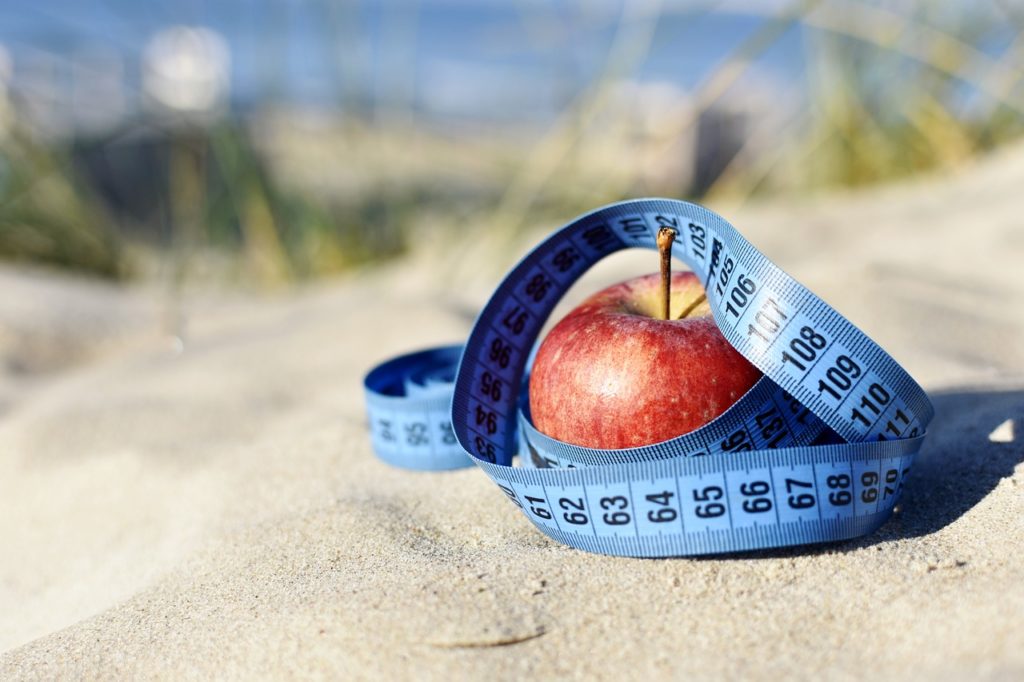While weight loss has a lot to do with what we eat, don’t underestimate the power of your mind in helping to shed winter kilos. Research shows that just by changing our behaviour around certain lifestyle habits, we can lose weight and improve our health.
You use a wide glass
Now you might have thought I was going to tell you that you need to give up alcohol but all I’m going to tell you is to change the shape of your glass. Research on wine drinkers shows that the amount poured may be influenced by the shape of the glass, the colour of the wine and even how you pour. In one study, wine drinkers typically poured 115ml of wine into a standard baseline 300ml glass, however when given a wider glass they poured 11.9% more and 9.2% more when the wine was white rather than red (the low contrast with the glass makes it difficult to see). The placement of the wine also influenced consumption with wine drinkers consuming 12.2% more when the wine glass was held in their hand rather than sitting on the table.
The researchers determined that using narrower wine glasses, drinking red wine instead of white and not pouring while holding one’s glass, are all steps toward modestly reducing the amount of wine a social drinker pours and drinks, while simultaneously reducing the amount of calories/kilojoules consumed. This could hypothetically result in weight loss .
You don’t eat at the dinner table
Not only is eating dinner at the dining table beneficial socially but family meals at the dinner table and their rituals might also be an underappreciated battleground to fight obesity . Families (both adults and children) who frequently eat dinner in the kitchen or dining room have significantly lower body mass index (BMI) compared to families who eat elsewhere (for example in front of the television). There are many reasons for this positive result but the most obvious appears to be awareness around food when eating at the table compared to the mindless eating that often occurs in front of the television.
You exercise but then compensate by eating more
Ever exercised then noticed you were gaining weight? If you’re like me, your lovely trainer might have kindly suggested you were putting on muscle but the body fat scales suggested otherwise. Nutritional interventions to reduce calories and portion sizes, and healthy tick labelling are effective only if people do not compensate for the energy they’ve used. Research reveals that people frequently sabotage their training efforts by rewarding themselves with food for being active . Instead of turning to food, try rewarding yourself with a massage or bubble bath.
You shop on an empty tummy
Research reveals that food deprivation (such as when people fast or skip a meal) results in us not only buying more, but also making different food purchases with a particular emphasis on high-calorie foods. Fasting and food deprivation has also been shown to increase brain reactivity to particular types of food over others. In one study, fasting participants showed increased activation in brain areas associated with reward, including the ventral striatum, amygdala, anterior insula, and medial and lateral orbiofrontal cortex, in response to high-calorie versus low-calorie foods. If you want to lose weight, it really does pay to eat before you do your grocery shopping.
You cut loose at the weekends
For many adults, diet and activity patterns differ substantially on weekends compared to weekdays. This has potential consequences on body weight and has been shown to promote the development or maintenance of being overweight or obese if the pattern is repeated throughout the year. Highest increases in weight gain appear to occur on Sundays and Mondays, with researchers suggesting this occurs due to the fact that the size of our meals as well as our intake of calories tends to increase on weekend . Additionally, research shows that our physical activity decreases on weekends, particularly on Sundays. Given that a reduction in exercise combined with an increase in calories is associated with weight gain, one way to keep on top of your weight loss goals without having to give up that brunch date or sleep in is to ensure that you keep moving at the weekend. After eating go for a long walk with friends or try something fun yet active like indoor trampolining or rock climbing.




